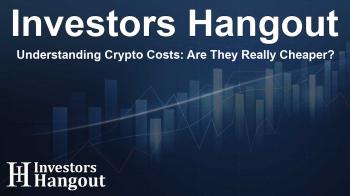Understanding Crypto Costs: Are They Really Cheaper?

Unraveling Cryptocurrency Costs
When engaging with cryptocurrencies, many individuals think they are escaping the hidden costs associated with conventional banking. However, each 'instant' transfer can be accompanied by numerous expenses like gas fees and withdrawal charges that resemble the traditional financial system.
The Warning from Industry Experts
Recently, investor Kevin O'Leary raised concerns about these costs, particularly focusing on Ethereum congestion leading to transaction fees exceeding $1,000. He compared this situation to paying astronomical tolls for a single-lane road, highlighting the growing conflict between crypto's intended low-cost structure and its actual implementation.
The New Middlemen: Exchanges and Fees
The new intermediaries in the crypto space—exchanges, wallet providers, and blockchain networks—are establishing intricate fee structures that compete directly with traditional finance. Popular platforms like Coinbase (NASDAQ: COIN) and Binance impose transaction spreads and withdrawal fees, while blockchain networks such as Ethereum introduce fluctuating gas fees based on usage demand.
The Layers of Cost
Users effectively pay multiple fees just to transfer their digital assets. The cumulative effect of these charges raises significant concerns regarding transparency and the profit-oriented nature of this ecosystem.
Cross-Border Transfers: A Cost Comparison
In contrast, traditional cross-border bank transfers through services like SWIFT can cost between $15 and $50 and may take several days. These fees are typically disclosed upfront. However, stablecoins like USDC, which aim for quicker transactions, can carry multiple hidden fee layers: network gas fees, transaction or withdrawal fees, and conversion costs back to fiat currency.
Hidden Expenses in Stablecoin Transactions
The actual cost of using these stablecoins can sometimes surpass that of traditional money transfers, with many users unaware of the extent of these fees until the transaction is complete.
The Growing Use of Digital Assets
As more people shift towards stablecoins for daily transactions, investments, and remittances, the fees associated with blockchain transactions and exchange withdrawals rapidly accumulate, often without users realizing the implications.
Key Players in the Cryptocurrency Ecosystem
- Crypto Exchanges: Platforms like Coinbase, Binance, Gemini, and Kraken facilitate the trade of cryptocurrencies and stablecoins, often charging high fees for transactions.
- Blockchain Networks: Networks like Ethereum impose variable gas fees for transactions, which fluctuate with network congestion.
- Wallet Providers: Digital wallets, such as MetaMask and others, may impose additional charges for transactions and withdrawals.
- Regulators: Government bodies are beginning to scrutinize stablecoin markets and the associated fee structures.
- Profiting Entities: New entrants, including various businesses in the crypto realm, aim to benefit from fees associated with lending and tokenization.
The Evolution of Cryptocurrencies
Bitcoin and Ethereum were initially created as alternatives to traditional banking, aimed at enabling peer-to-peer transactions without intermediaries. However, the current ecosystem has introduced many of the same limitations previously critiqued in the financial industry.
Market Response to High Fees
Frustration is palpable among users facing high transaction costs, with many feeling that the vision of democratic currency ownership remains unfulfilled. Expert opinions highlight that transparency in fees and regulation is crucial to restore faith in cryptocurrency.
Future Expectations for Cryptocurrency Developments
As interest in stablecoins and Ethereum transactions grows, the demand for clearer fee structures and consumer protections increases. Regulation and advancements in technology may be necessary to realize the goal of economical, decentralized finance.
Frequently Asked Questions
What are hidden costs in cryptocurrency transactions?
Hidden costs include network fees, transaction fees charged by exchanges, and additional fees for converting stablecoins back into fiat currencies.
How do crypto fees compare to traditional bank fees?
While traditional bank fees are often disclosed upfront, crypto fees can be less transparent and may accumulate significantly during transactions.
What is the impact of transaction fees on cryptocurrency adoption?
High transaction fees can deter potential users from adopting cryptocurrencies for everyday use, as they may see little value in the cost versus traditional banking methods.
Who are the key players in the cryptocurrency ecosystem?
Key players include crypto exchanges, blockchain networks, wallet providers, and regulatory entities that oversee compliance and user protection.
How is regulation influencing the cryptocurrency market?
Increased regulation aims to provide more transparency and consumer protection, potentially fostering greater trust in cryptocurrencies and encouraging broader adoption.
About The Author
Contact Kelly Martin privately here. Or send an email with ATTN: Kelly Martin as the subject to contact@investorshangout.com.
About Investors Hangout
Investors Hangout is a leading online stock forum for financial discussion and learning, offering a wide range of free tools and resources. It draws in traders of all levels, who exchange market knowledge, investigate trading tactics, and keep an eye on industry developments in real time. Featuring financial articles, stock message boards, quotes, charts, company profiles, and live news updates. Through cooperative learning and a wealth of informational resources, it helps users from novices creating their first portfolios to experts honing their techniques. Join Investors Hangout today: https://investorshangout.com/
The content of this article is based on factual, publicly available information and does not represent legal, financial, or investment advice. Investors Hangout does not offer financial advice, and the author is not a licensed financial advisor. Consult a qualified advisor before making any financial or investment decisions based on this article. This article should not be considered advice to purchase, sell, or hold any securities or other investments. If any of the material provided here is inaccurate, please contact us for corrections.

